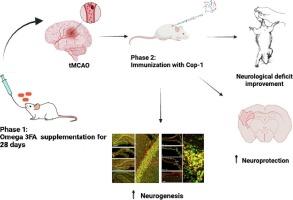改善神经保护和神经发生的两阶段疗法:中风后预防性使用欧米茄脂肪酸加共聚物-1免疫。
IF 2.7
4区 医学
Q3 NEUROSCIENCES
引用次数: 0
摘要
中风是一个重大的全球性健康问题,是全球第二大死亡原因和主要致残原因。然而,目前的治疗方案仍然有限。作为初级预防的一种形式,营养补充是一种潜在的中风治疗方法。尤其是摄入欧米伽-3 脂肪酸(ω-3FA)具有抗炎和保护神经的作用,有助于降低中风风险。与此同时,Copolymer-1(COP-1)是一种通过Th1/Th2/Th3表型转换而具有免疫调节特性的多肽,在中风模型中同样具有神经保护和神经恢复作用。为了研究这些疗法的综合效果,我们设计了一种两阶段疗法:第一阶段是预防性补充欧米伽-3FA,第二阶段是在中风损伤后进行 COP-1 免疫。Sprague-Dawley 大鼠被随机分配到四组中的一组:1)对照组;2)ω-3FA 组;3)COP-1 组;4)ω-3FA + COP-1 组。在诱发中风之前,给小白鼠注射 28 天的ω-3FA。再灌注后 30 分钟,用 COP-1 对各组进行免疫。中风后七天,用Zea-Longa量表评估神经功能缺损情况,用2,3,5-三苯基氯化四氮唑(TTC)染色评估梗死体积,用免疫荧光成像评估神经发生水平。结果表明,两阶段疗法产生了显著的协同效应,明显减少了神经功能缺损和梗死体积,同时增强了神经源龛中的神经源活动。这种联合疗法凸显了整合营养和药物策略以促进中风康复的潜力。本文章由计算机程序翻译,如有差异,请以英文原文为准。

Two-phase therapy for improving neuroprotection and neurogenesis: Preventive use of omega fatty acids plus Copolymer-1 immunization after stroke
Stroke is a major global health issue, ranking as the second leading cause of death and the primary cause of disability worldwide. However, current therapeutic options remain limited. Nutritional supplementation as a form of primary prevention stands as a potential stroke therapeutic. In particular, the intake of omega-3 fatty acids (omega-3FA) exerts anti-inflammatory and neuroprotective effects that help reduce the risk of stroke. In parallel, treatment with Copolymer-1 (COP-1), a peptide with immunomodulatory properties through Th1/Th2/Th3 phenotype switching, similarly affords neuroprotective and neurorestorative effects in stroke models. To investigate the combined effects of these treatments, we designed a two-phase therapy: the first phase involved preventive supplementation with omega-3FA, while the second phase included COP-1 immunization following stroke injury. Sprague-Dawley rats were randomly assigned to one of the four groups: 1) control, 2) omega-3FA, 3) COP-1, and 4) omega-3FA + COP-1. Omega-3FAs were administered for 28 days before inducing stroke. Thirty minutes after reperfusion, the respective groups were immunized with COP-1. Seven days post-stroke, neurological deficits were assessed using the Zea-Longa scale, infarct volumes with 2,3,5-triphenyltetrazolium chloride (TTC) staining, and levels of neurogenesis via immunofluorescence imaging. The results showed that the two-phase therapy produced significant synergistic effects, markedly reducing neurological deficits, and infarct volumes, while enhancing neurogenic activities in neurogenic niches. This combined approach underscores the potential of integrating nutritional and pharmacological strategies to enhance stroke recovery.
求助全文
通过发布文献求助,成功后即可免费获取论文全文。
去求助
来源期刊

Brain Research
医学-神经科学
CiteScore
5.90
自引率
3.40%
发文量
268
审稿时长
47 days
期刊介绍:
An international multidisciplinary journal devoted to fundamental research in the brain sciences.
Brain Research publishes papers reporting interdisciplinary investigations of nervous system structure and function that are of general interest to the international community of neuroscientists. As is evident from the journals name, its scope is broad, ranging from cellular and molecular studies through systems neuroscience, cognition and disease. Invited reviews are also published; suggestions for and inquiries about potential reviews are welcomed.
With the appearance of the final issue of the 2011 subscription, Vol. 67/1-2 (24 June 2011), Brain Research Reviews has ceased publication as a distinct journal separate from Brain Research. Review articles accepted for Brain Research are now published in that journal.
 求助内容:
求助内容: 应助结果提醒方式:
应助结果提醒方式:


